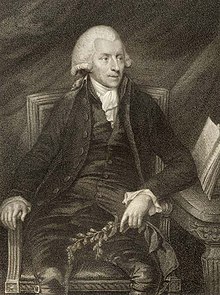William Withering FRS | |
|---|---|
 | |
| Born | 17 March 1741 Wellington, Shropshire, England |
| Died | 6 October 1799 (aged 58) Sparkbrook, Birmingham, England |
| Nationality | English |
| Citizenship | Great Britain |
| Known for | Discovery of digitalis |
| Scientific career | |
| Fields | Botanist, geologist, chemist, physician |
| Academic advisors | William Cullen |
| Signature | |
 | |
William Withering FRS (17 March 1741 – 6 October 1799) was an English botanist, geologist, chemist, physician and first systematic investigator of the bioactivity of digitalis.
Withering was born in Wellington, Shropshire, the son of a surgeon.[1] He trained as a physician and studied medicine at the University of Edinburgh Medical School. He worked at Birmingham General Hospital from 1779. The story is that he noticed a person with dropsy (swelling from congestive heart failure) improve remarkably after taking a traditional herbal remedy; Withering became famous for recognising that the active ingredient in the mixture came from the foxglove plant.[2] The active ingredient is now known as digoxin, after the plant's scientific name. In 1785, Withering published An Account of the Foxglove and some of its Medical Uses, which contained reports on clinical trials and notes on digitalis's effects and toxicity.[3]
- ^ "William Withering (1741-1799), a biographical sketch of a Birmingham Lunatic. - The James Lind Library". The James Lind Library. Retrieved 24 August 2017.
- ^ Haughton, Claire (1980). Green Immigrants. New York: Harcourt, Brace, Jovanovich. pp. 133–134. ISBN 0-15-636492-1.
- ^ William Withering, An Account of the Foxglove and some of its Medical Uses (Birmingham, England: M. Swinney, 1785).